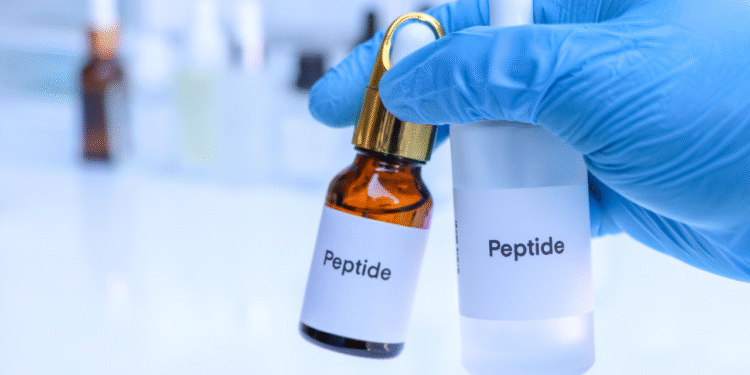Peptides may sound like a scientific buzzword, but they are steadily gaining recognition in the world of wellness, fitness, and functional medicine. While they’re often associated with skincare, their influence on overall health is far more extensive and profound.
This article breaks down the top 10 benefits of peptides—based on real science—showing how these powerful short-chain amino acids are transforming the way we support our bodies from the inside out.
What Are Peptides, Briefly?
Peptides are chains of amino acids that are shorter than proteins. They function as cellular messengers, instructing various systems in the body to perform tasks such as healing tissue, producing hormones, and regulating inflammation.
They can be found naturally in the body, in foods (especially high-protein sources), or produced synthetically for medical and therapeutic use. But what are the real benefits of peptides when it comes to your health?
Let’s dive in.
1. Enhances Wound Healing and Tissue Repair
One of the most studied benefits of peptides is their role in accelerating wound healing. Certain peptides like thymosin beta-4 stimulate tissue regeneration, collagen formation, and new blood vessel development at the site of injury.
This is especially useful for:
- Post-surgical recovery
- Diabetic ulcers
- Sports injuries
- Skin trauma
Some peptides are even being explored as alternatives to traditional antibiotics for treating infected wounds.
2. Improves Muscle Growth and Recovery
Athletes, bodybuilders, and fitness lovers often look to peptides for their ability to support muscle development. Synthetic peptides like IGF-1 LR3 and Growth Hormone-Releasing Peptides (GHRPs) help:
- Stimulate muscle protein synthesis
- Speed up post-workout recovery
- Increase strength over time
These benefits aren’t limited to athletes — peptides are also studied in sarcopenia (age-related muscle loss), helping older adults maintain mobility and independence.
3. Boosts Cognitive Function and Mental Clarity
Some peptides have nootropic effects, meaning they may enhance brain function. For instance:
- Selank is studied for its anti-anxiety and mood-regulating properties
- Semax has shown promise in improving memory, attention, and stress resilience
These cognitive peptides may work by increasing neurotransmitter balance, reducing oxidative stress, and promoting brain plasticity — especially valuable in mental fatigue, burnout, or neurodegenerative conditions.
4. Promotes Better Sleep Quality
Peptides can influence your circadian rhythm and help regulate hormones like melatonin and growth hormone. The peptide DSIP (Delta Sleep-Inducing Peptide) has been shown to:
- Improve deep sleep stages
- Reduce insomnia symptoms
- Normalize disrupted sleep cycles
Since poor sleep affects immunity, metabolism, and mood, this is one of the underrated benefits of peptides that deserves attention.
Read more : Sakit & Luka di Tepi Bibir? Mungkin Anda Alami Angular Cheilitis
5. Supports Fat Loss and Metabolism
Certain peptides can encourage the body to burn fat more efficiently. For example:
- CJC-1295 and Ipamorelin stimulate growth hormone release, which in turn boosts metabolism
- AOD-9604 is a fat-burning peptide being studied for obesity and metabolic syndrome
These peptides may help reduce abdominal fat, enhance energy use, and support long-term weight management — especially when combined with a proper diet and exercise.
6. Balances Hormones Naturally
Peptides act as messengers for hormone regulation. This is especially important in people experiencing:
- Menopause or andropause
- Thyroid imbalances
- Low testosterone or growth hormone
By mimicking natural hormones, peptides like Tesamorelin and Kisspeptin help the body restore hormonal balance without synthetic hormone replacement, potentially lowering side effects and improving long-term outcomes.
7. Strengthens Immune Function
A healthy immune system is your body’s best defense, and peptides play a key role in supporting it. Peptides like:
- Thymosin alpha-1 – Boost immune cell production and regulate inflammatory responses
- LL-37 – Help defend against bacterial, viral, and fungal infections
Peptide-based immunotherapies are also being explored for treating autoimmune conditions, chronic infections, and even cancer.
8. Reduces Inflammation and Joint Pain
Chronic inflammation is linked to nearly every modern disease—from arthritis to cardiovascular issues. Certain peptides have anti-inflammatory properties that help:
- Reduce joint swelling
- Protect cartilage from degeneration
- Alleviate pain and stiffness
One example is BPC-157, often used by those with tendon, ligament, or joint injuries. This makes it a favorite among athletes and individuals with conditions like osteoarthritis.
9. Improves Gut Health and Digestive Balance
Gut health is foundational to overall well-being, and peptides can support this too. BPC-157, for instance, is widely researched for its ability to:
- Repair intestinal lining
- Reduce inflammation in the gut
- Heal ulcers and leaky gut
This benefit is crucial for people with conditions like IBS, Crohn’s disease, or general digestive sensitivity.
10. Supports Anti-Aging at the Cellular Level
Perhaps the most widely marketed benefits of peptides involve anti-aging. While this often refers to wrinkle reduction, the effects go much deeper.
Peptides may:
- Encourage telomere repair (linked to cell longevity)
- Stimulate mitochondrial function
- Improve skin elasticity and hydration
- Delay the onset of age-related diseases
Whether through oral supplements, injections, or topical creams, peptides are helping people not only look younger but feel younger too.
Are Peptides a Magic Bullet?
Not quite. While the benefits of peptides are compelling, they’re not miracle cures. Their effectiveness depends on:
- The type of peptide used
- The delivery method (topical, injectable, oral)
- Individual health conditions and lifestyle factors
Peptides used under medical supervision show great potential. However, self-prescription or buying unregulated products online can pose risks.
Safety and Side Effects
Most naturally occurring peptides are considered safe in the right dose. However, synthetic or experimental peptides should be used cautiously. Possible side effects may include:
- Water retention
- Headaches
- Increased appetite
- Local irritation (with injections)
- Hormonal disruption (if misused)
Consulting a qualified healthcare professional before starting peptide therapy is strongly recommended.
Final Thoughts
The benefits of peptides span across many vital areas of health—from immune support to fat metabolism, mental clarity to injury recovery. As science continues to explore and refine their uses, peptides are proving to be more than just a fleeting trend.
Whether you’re aiming to optimize your body’s performance, manage aging more gracefully, or simply support healing, peptides could be a valuable tool in your wellness routine — when used wisely.
🔍 Key Takeaways:
- Peptides are amino acid chains that act as messengers in the body.
- Their benefits range from muscle growth, hormone balance, and brain health to gut repair and anti-aging.
- Use peptides cautiously, ideally under the guidance of a professional.
More interesting article here : Manfaat Kandungan Peptida pada Produk Skincare



















